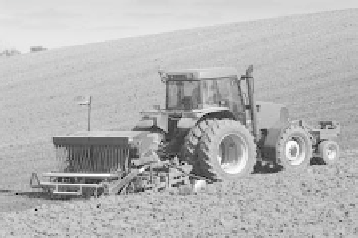Geoscience Reference
In-Depth Information
Federal Recognition of Agroterrorism Threats
Agriculture and food production generally have received relatively less attention, or
sometimes were overlooked, in counterterrorism and homeland security. After what
many observers claim to be a slow start after September 11, 2001, agriculture now
is garnering more attention in the expanding field of terrorism studies and policies
(Figure 16.3).
Congress has held hearings on agroterrorism and, while addressing terrorism
more broadly, has implemented laws and appropriations with provisions impor-
tant to agriculture. The Government Accountability Office has studied aspects of
food safety, border inspections, and physical security with respect to agroterrorism.
The executive branch has responded by implementing the new laws, issuing several
Presidential directives, and creating terrorism and agroterrorism task forces.
In its report, the 9/11 Commission (National Commission on Terrorist Attacks
upon the United States) does not make any direct references to agroterrorism or
terrorist attacks on the food supply. However, agriculture obviously would be
affected, along with other sectors of the economy, by some of the commission's
recommendations regarding coordination of intelligence, information sharing, and
first responders.
Congressional Hearings and Laws
On November 19, 2003, the Senate Committee on Governmental Affairs held a
hearing titled, “Agroterrorism: The Threat to America's Breadbasket,” including
witnesses from the Administration, state governments, and a private think tank.
This was the first congressional hearing devoted entirely to agroterrorism
since October 27, 1999. At that time, the Subcommittee on Emerging Threats
of the Senate Committee on Armed Services held a hearing titled, “Agricultural
Biological Weapons Threat to the United States.” During the four years between
Figure 16.3 Agriculture is garnering more attention in policy discussions and
terrorism studies.

